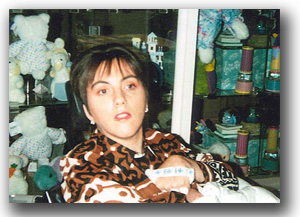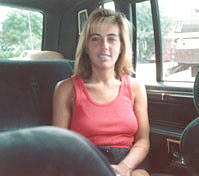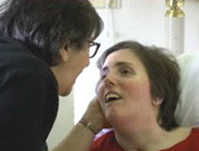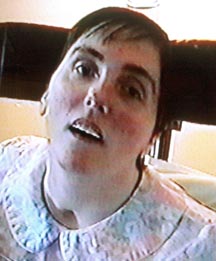Wednesday, March 30, 2005
When will we learn?

The heart wrenching and complex saga of Terri Schiavo has touched America's heart. It has also brought up important questions for each of us to consider and explore. What is the meaning of life? What is the value of life? What makes life worth living? Who is really looking out for the best interests of this woman? Who can even know what her best interests really are? I wouldn't claim to have definitive answers to these questions, and perhaps it is not meant for us to have clear-cut, black and white answers to such metaphysical principles as the nature of life and death.
Where do we go when we die? Is keeping Terri Schiavo alive and in this apparently permanent vegetative state holding her back from moving on to something better, whether to heaven, or life in a new body, or as some other unknowable dimension of soul expression in this vast universe where, some posit, no energy is ever lost but ever recycled into new forms? Or could it be that being stuck in an invalid body is the best option that Terri's soul can hope for - the only way she can experience, to whatever degree, the great and precious gift of life? Who can know? In fact, nobody truly knows, although some may have better and more deeply considered theories and understandings to share.


Did Teri really ask to not be kept alive with extraordinary circumstances? Can we trust her husband, who may rub us the wrong way, to be an unbiased and accurate reporter of something she may have said while watching a television show when life was oh so different for her? Even if Terri did make a comment at that time, does she still feel the same way now, assuming there is anything inside of her that feels anything? This is an inherent problem with living wills – many who might say they wouldn’t want to be kept alive in certain circumstances would undoubtedly change their minds when in those very circumstances. For example, I remember thinking, as a teenager, that I would never want to live to be as old as 40 years, but here I am now at 45, and I’m glad that I never signed a “pull the plug at age 40” document.
Nevertheless, one good result of this heart-wrenching story that has played across our television stations for weeks, months, and even years, is just that – it has wrenched our hearts open. Hearts made rigid and unmoved by too many violent scenes, real and manufactured, plastered across our media, in our homes, and with our morning cup of coffee, are finding a certain painful discomfort in the thought that this woman, conscious or not, is being starved and dehydrated to death. Who would do that to an animal? Who would want to even do that to a plant? What kind of society would “pull the plug” by allowing someone to slowly and possibly painfully die from lack of physical necessities that are available and plentiful? What kind of society do we have that has not found a compassionate way to allow someone to leave this life, without having to endure weeks of suffering, starvation, and thirst? Our hearts are wrenched because we know this is wrong. Our hearts are wrenched because we’ve also heard from those rare others who have healed from similar apparently vegetative states to declare that they had been aware and unable to respond physically. We know it is possible that this beautiful woman, Teri Schiavo, who probably has no idea that the eyes and hearts of the world, the congressional, judicial, and legislative branches of the American government, and even the Pope himself are upon her, may be suffering without the ability to speak or demonstrate outwardly an inner awareness that just might be experiencing some portion of all that her body is going through.

One man's grandmother was in a coma for several months. Every day, he would visit, sit with her, and read passages from the bible. She showed no sign of comprehension or consciousness. Finally, one day, he implored her to just let go. “It’s time for you to go, just let go.’ According to his story, his grandmother opened her eyes, sat up a bit, and declared with attitude, “You just keep doing what you’re doing and I’ll keep doing what I’m doing!” and then fell back into the apparently comatose state. One thing that this story shows, and which has become so clear during discussions about the Teri Schiavo case, is that we don’t truly know. Theologians don’t know, doctors don’t know, family members, educators, and journalists don’t truly know what is life, what is right, what is healthy, or what levels of consciousness may be active with no outer sign at all.
However, now that we have become aware of how heart wrenching it is to watch someone even with minimal consciousness possibly suffer, why don’t we use this new awareness to become better human beings? Why don’t we reconsider all the ways that human beings today starve, kill, and torture not only other human beings, but animals – precious, loving, conscious and feeling animals who suffer by the millions every day in slaughterhouses and medical research facilities. Why not use Terri Schiavo’s tragedy to make ourselves greater and to really take a look at what life is and how life – in all forms – should be approached and regarded? I suppose the answer to the question "When will we learn?" is that this is how we learn -- by working together to discuss and contemplate situations that arise in search of what is true, what is right, and what is best.